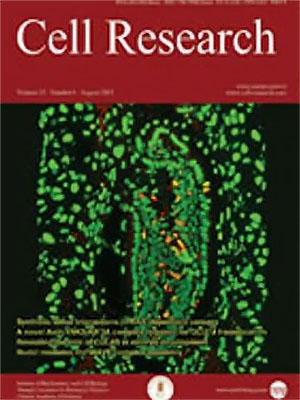
Volume 14, No 4, Aug 2004
ISSN: 1001-0602
EISSN: 1748-7838 2018
impact factor 17.848*
(Clarivate Analytics, 2019)
Volume 14 Issue 4, August 2004: 331-340
ORIGINAL ARTICLES
Expression of DNA-dependent protein kinase in human granulocytes
Annahita SALLMYR1, Anna MILLER1,2, Aida GABDOULKHAKOVA1,2, Valentina SAFRONOVA1,2, Gunnel HENRIKSSON1, Anders BREDBERG1,*
1Department of Medical Microbiology, Lund University, Malmo University Hospital, S-205 02 Malmo, Sweden.
2Laboratory of Nerve Cell Biophysics, Institute of Cell Biophysics, Russian Academy of Sciences, Pushchino, Moscow region, 142290 Russia.
Correspondence: Anders BREDBERG(anders.bredberg@mikrobiol.mas.lu.se)
Human polymorphonuclear leukocytes (PMN) have been reported to completely lack of DNA-dependent protein kinase (DNA-PK) which is composed of Ku protein and the catalytic subunit DNA-PKcs, needed for nonhomologous end-joining (NHEJ) of DNA double-strand breaks. Promyelocytic HL-60 cells express a variant form of Ku resulting in enhanced radiation sensitivity. This raises the question if low efficiency of NHEJ, instrumental for the cellular repair of oxidative damage, is a normal characteristic of myeloid differentiation. Here we confirmed the complete lack of DNA-PK in PMN protein extracts, and the expression of the truncated Ku86 variant form in HL-60. However, this degradation of DNA-PK was shown to be due to a DNA-PK-degrading protease in PMN and HL-60. In addition, by using a protease-resistant whole cell assay, both Ku86 and DNA-PKcs could be demonstrated in PMN, suggesting the previously reported absence in PMN of DNA-PK to be an artefact. The levels of Ku86 and DNA-PKcs were much reduced in PMN, as compared with that of the lymphocytes, whereas HL-60 displayed a markedly elevated DNA-PK concentration. In conclusion, our findings provide evidence of reduced, not depleted expression of DNA-PK during the mature stages of myeloid differentiation.
FULL TEXT | PDF
Browse 2034


